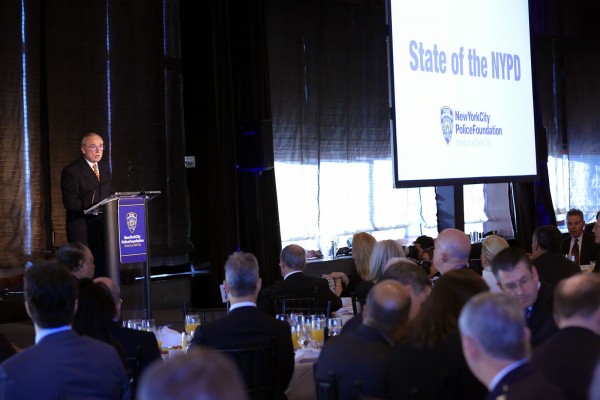
Police Commissioner Bill Bratton last week delivered his State of the NYPD address at the Police Foundation.
Photo Courtesy of NYPD
After a tumultuous 2014, the city eagerly anticipated Police Commissioner Bill Bratton’s vision for the coming year, which he laid out last Thursday in his State of the NYPD address at the Police Foundation.
“Ladies and gentlemen, the state of your NYPD is strong,” Bratton declared. “We have faced a lot—even more than a great department in the world’s greatest city might be expected to face: new terrorist threats, a national crisis surrounding policing, protests, the assassination of two of our officers. And through it all, we have remained true to the ultimate role of the police: to prevent crime and disorder.”
Overall crime dropped 4.5 percent from 2013 to 2014, Bratton noted, before ticking off agency achievements over the past 12 months, including record low numbers for murders, robberies and burglaries.
“Major crime in the transit system down 87 percent, even as ridership has exploded,” he added.
Bratton also detailed new initiatives for the world’s largest police department. In the wake of the Paris terrorist attacks, the NYPD developed a Strategic Response Group.
“SRG will put nearly 600 specially assigned officers in locations around the city, and dedicate them to advanced disorder control and counterterror,” Bratton explained. “It is designed for dealing with events like our recent protests, or incidents like Mumbai or what just happened in Paris. They’ll be equipped and trained in ways that patrol officers are not. And it will allow us to staff important programs like site protection and critical-response vehicles without using precinct personnel.”
Noting how his education as a cop was shaped by the advice and example of the veteran cops who taught and guided him, Bratton unveiled the Partner Officer Program. Calling it “a return to real field training,” Bratton said that unlike Operation IMPACT, POP would immerse cops in the neighborhoods they serve, allowing the officers to “focus on the service aspects of our work.”
Bratton admittedly saved “the most ambitious” part of his vision for last. The Police/Community Compact is the definition of community policing.
“At its heart are the sector officers who have taken responsibility for particular sectors,” Bratton said. “In each sector, these officers will be led by a Neighborhood Coordinating Officer. The NCO will be instrumental in identifying problems and conditions, in leading the other sector officers to address problems, and in connecting with neighborhood residents. We envision a series of neighborhood forums across the city, informal meetings between sector officers and residents from their respective sectors. These wouldn’t just be social get-togethers. They’ll be genuine working sessions in which neighbors and cops collaborate on plans and strategies. We also envision opening dialogues between cops and young people from each sector, to find some common ground between actors who have often been at odds. This will be local government at the most local level.”
In closing, Bratton related how it all comes down to respect on each side of the police-citizen dynamic.
“Treating officers more fairly and holding them accountable for how fairly they treat the people they serve—this makes a safer, fairer city,” he said.
By Michael V. Cusenza
